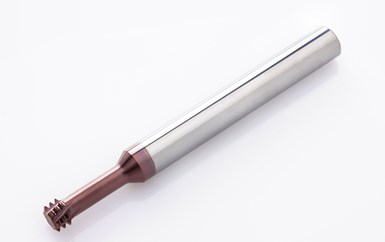Carmex Solid Carbide Thread Mills Cut Heat-Resistant Materials
Appears in Print as: 'Solid Carbide Thread Mills Cut Heat-Resistant Materials'
Thread mills feature more flutes for improved performance in hard materials and are constructed of a specially formulated carbide that is triple coated.
Edited by Angela Osborne

Carmex Precision Tools’ FSH solid carbide thread mill
Carmex Precision Tools’ FSH solid carbide thread mills are designed for faster, more accurate thread milling in hard and heat-resistant materials. The thread mills feature more flutes for improved performance in cutting hard materials; and are constructed of a specially formulated carbide that is triple coated and carries from five to seven flutes, depending on size.
The left-handed helix configuration results in a faster, smoother and more accurate cut thanks to reduced deflection, the company says. The FSH series, which extends from 0.45 to 1.25 mm pitch, can be used in both conventional machining and Swiss-style applications.
The FSH thread mills combines the latest in substrate and coatings with multiple flutes and a highly effective left-hand helix design to achieve both better performance and longer tool life in hard-to-machine materials. This includes alleviating breakage, which leads to expensive scrappage for both manufacturers and shops, especially in aerospace, medical parts and other industries.
RELATED CONTENT
-
Understanding CNC Collet Chucks
Workholding for turning is usually fairly basic: The selection comes down to chucks or collets. This article looks at when to consider the collet chuck and what kind might be best for a given application.
-
Collets Vs. Chucks
Find the definition, types and advantages of both CNC collets and chucks for workholding as well as the best applications for each, in this article.
-
Advantages of Cellular Manufacturing
Manufacturing cells are used to minimize product movement as well as materials, equipment and labor during the manufacturing process. By reducing cycle times and material handling, these cells help shops more easily meet customer demands regarding cost, quality and leadtimes.



